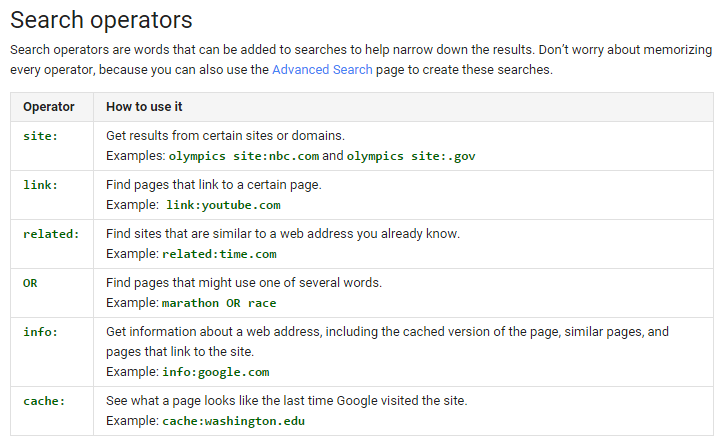Advanced search commands have been used for years and are the foundation of “old-fashioned SEO meaning that checking the basis of SEO without the use of special software or online tools of which our online world is saturated with too many which only display limited results, the “good” data comes at a cost for a monthly subscription.
By gaining a better understanding of advanced search commands, you can become a lot more resourceful when doing down-and-dirty site auditing, link prospecting, and competitor analysis for your SEO clients, it also just might reveal what work other SEO companies have done in the past, or not..
Just as an FYI- there are so many ways to use these advanced search commands that I cannot cover it all within this article but will outline some basics and the benefits of using them.
Site: [site:example.com]
Adding site: to your query will restrict the search results to only the domain that you specify as this example above shows: This will allow you to scan indexed URLs to get an idea of the information architecture, any potential duplicate content/page issues, and get a good idea of the number of pages that have been indexed. Here are some important questions which may be answered using this command:
- How big is the blog of a competitor site relative to the approximate total pages indexed?
- How many of those sort pages without are indexed?
- How many paginated pages are indexed?
- Are those non-www. version of pages getting indexed.
Any time you want to analyze content within a site, the site: command is a very robust tool to have in your analysis toolbox.
Related:[related:example.com]
When you use the related command, Google will return webpages that are similar to the webpage you specify. The related command has been used to find out the “neighborhood” or clusters of backlinks. However, keep in mind that there has been debate over the years on how accurate this command is for Google specifically, and results vary from Search Engine to Search Engine.
Intitle: and Allintitle: [intitle:keyword], [Allintitle:keyword]
When you use the query intitle: Google restricts the results it returns to those containing the term that you included in the title.
When you use allintitle:internetmarketing, Google restricts results to those that contain the keyword that you specified in the title. So if you search [internet marketing] Google will only fetch results that contain the keywords ”internet” and “marketing” in the title. Notice the addition of the conjunction. [allintitle:keyword phrase] this command can be combined with a site: command to help identify templated, thin or duplicate pages by just identifying a part of the title that appears across the thin pages and searching for it. You will see about how many of those types of pages Google has indexed.
Here are 2 other advanced search commands that may also be helpful in your analysis:
Google Reverse Image Search
While this is not exactly an advanced search command, it is a cool tool to use, if you just click the little camera in the Google image search bar and you can query an image link or a local file and it will tell you all of the places your image has been found. If you’re an image heavy site, you can easily reach out to websites that have snagged your images and ask them for a citation back to your site. This is also a wakeup call to see how images and other media travel around the web.
Google Verbatim
This also is not a search command, but Google Verbatim allows you to search using the exact keyword or keyword phrases you typed, so no spelling corrections, no replacing words with synonyms, and no words with the same stem, or personalization. Verbatim gives you search rankings without the preservatives sort of speak. To get to verbatim from a Google Search Engine Results Page, click on Search tools, then you’ll find it in the All Results sub-menu.
There are many more types of search commands most are only familiar to the coding cowboys and website developers which get down and dirty with code every day. If you are managing clients SEO campaigns, or part of the technical sales process for selling SEO services, these advanced search commands will bring value into your client research. Here below is a summary list of the above mentioned advanced search commands and some others.





